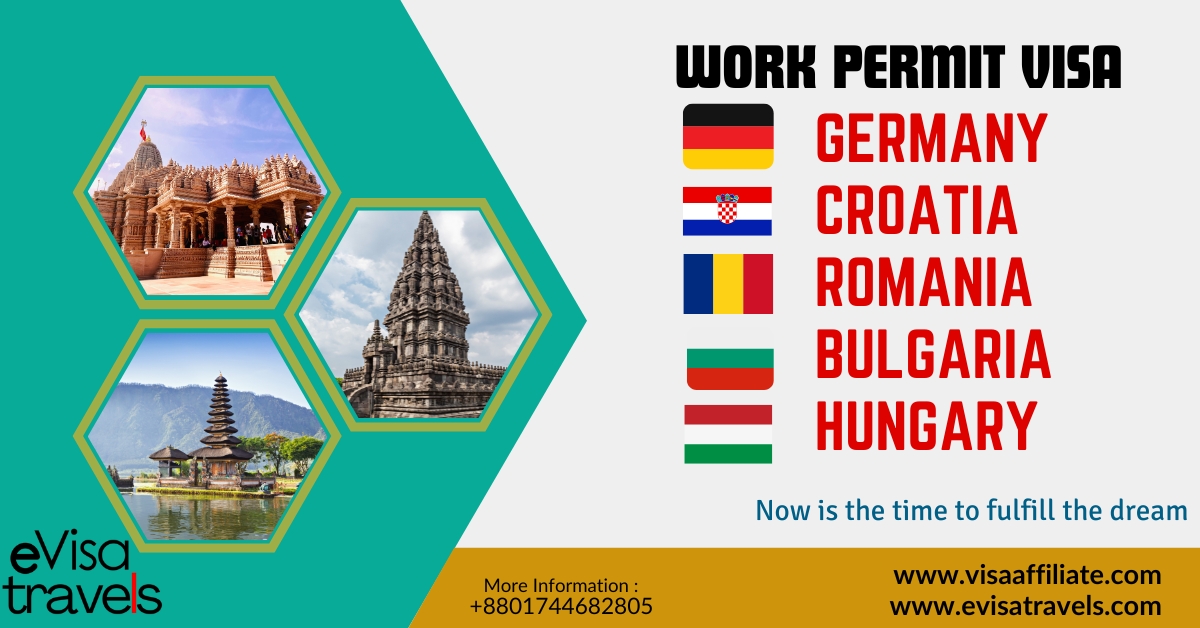Germany: Work Permit Visa Requirements
Germany offers several types of work visas depending on your qualifications and the job offer. Non-EU citizens must obtain a work permit before working in Germany.
Common Work Visa Types:
- Employment Visa: For individuals with a job offer in Germany.
- EU Blue Card: For highly skilled workers with a recognized university degree or comparable qualification.
- Job Seeker Visa: For highly qualified workers looking for employment in Germany.
Basic Requirements:
- A job offer from a German employer.
- Proof of qualifications (degree, diploma).
- Health insurance coverage.
- Proof of sufficient funds to support yourself (for Job Seeker Visa).
- German language proficiency may be required for some jobs.
Croatia: Work Permit Visa Requirements
Croatia, as an EU member state, has specific rules for non-EU nationals applying for work permits. Citizens of EU countries do not require a permit, but non-EU nationals must meet certain conditions.
General Process for Non-EU Nationals:
- Work Permit: A non-EU national needs a job offer from a Croatian employer.
- Temporary Stay Visa: This visa is required along with the work permit for non-EU workers.
- Labor Market Test: The employer must prove that no EU citizens are available for the job.
Key Documents:
- Valid passport.
- Job offer and work contract.
- Proof of qualifications.
- Health insurance.
- Proof of accommodation.
Bulgaria: Work Permit Visa Requirements
Bulgaria, also part of the European Union, requires non-EU nationals to obtain a work permit and residence visa to work legally in the country.
Work Permit Types:
- General Work Permit: For non-EU nationals with a job offer from a Bulgarian employer.
- Highly Skilled Worker Permit: For highly qualified professionals.
- Seasonal Work Visa: For workers in seasonal industries.
Application Process:
- The employer must apply for the work permit on behalf of the employee.
- The employee must apply for a residence visa after the permit is granted.
- The application must prove there are no suitable EU candidates for the job.
Key documents include a passport, job contract, and proof of accommodation. Check out the Bulgarian Ministry of Foreign Affairs for up-to-date details.
Romania: Work Permit Visa Requirements
Romania requires a work permit for non-EU nationals seeking employment. Romania’s work visa system is similar to that of other EU countries.
Types of Work Permits:
- Work Permit: For employees with a job offer.
- Highly Skilled Worker Permit: For those in specific fields (e.g., IT, healthcare).
- Seasonal Worker Visa: For jobs in sectors like agriculture.
Required Documents:
- A valid job offer from a Romanian employer.
- Proof of qualifications.
- Work contract.
- Health insurance and proof of accommodation.
The employer must demonstrate that there are no EU citizens available for the position. For more details, visit the Romanian Ministry of Foreign Affairs.
Hungary: Work Permit Visa Requirements
Hungary issues work permits to non-EU nationals who have a job offer from a Hungarian employer.
Work Visa Types:
- General Work Visa: For skilled and unskilled workers.
- EU Blue Card: For highly qualified workers with specific skills.
- Digital Nomad Visa (White Card): For remote workers employed outside Hungary.
General Application Process:
- The employer must apply for a work permit before the employee can apply for a residence visa.
- The employer must show that the job cannot be filled by an EU citizen.
- Documents typically required include a passport, work contract, and proof of qualifications.
The White Card, which allows remote workers to live in Hungary while working for companies outside the country, is an increasingly popular option. More details are available on Hungary’s official immigration website.
General Considerations:
-
Language Requirements: Depending on the role, some countries may require proof of proficiency in the local language (especially in Germany, Romania, and Hungary).
-
Health Insurance: For all work visas, applicants must provide proof of adequate health insurance coverage during their stay.
-
Processing Time: Work permit applications can take several weeks or months, so it’s important to apply well in advance.
-
Employer Sponsorship: In many cases, the employer must sponsor your application for the work permit, ensuring there are no suitable candidates within the EU.








